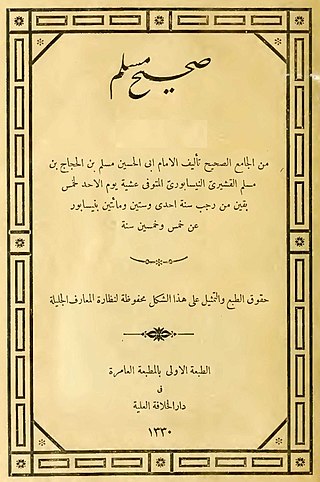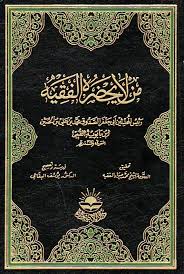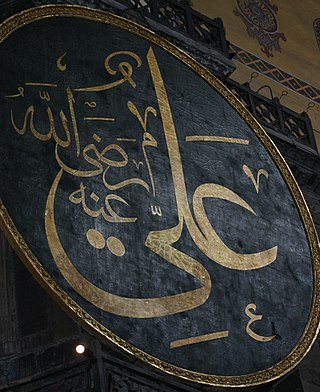
Hadith is a form of Islamic oral tradition containing the purported words, actions, and the silent approvals of the prophet Muhammad. Each hadith is associated with a chain of narrators. Compilations of hadith were aggregated into distinct collections by Islamic scholars in the centuries after Muhammad's death. Hadith are widely respected in mainstream Muslim thought and are central to Islamic law.

Abū ʿAbd Allāh Muḥammad ibn Ismāʿīl ibn Ibrāhīm al-Juʿfī al-Bukhārī was a 9th-century Muslim muhaddith who is widely regarded as the most important hadith scholar in the history of Sunni Islam. Al-Bukhari's extant works include the hadith collection Sahih al-Bukhari, al-Tarikh al-Kabir, and al-Adab al-Mufrad.

Al-Kahf is the 18th chapter (sūrah) of the Qur'an with 110 verses (āyāt). Regarding the timing and contextual background of the revelation, it is an earlier Meccan surah, which means it was revealed before Muhammad's hijrah to Medina, instead of after.

Sahih Muslim is the second hadith collection of the Six Books of Sunni Islam. Compiled by Islamic scholar Muslim ibn al-Ḥajjāj in the musannaf format, the work is valued by Sunnis, alongside Sahih al-Bukhari, as the most important source for Islamic religion after the Qur'an.

Sunan Abi Dawud is the third hadith collection of the Six Books of Sunni Islam. It was compiled by Persian scholar Abu Dawud al-Sijistani.

Bihar al-Anwar is a comprehensive collection of hadith compiled by Shia scholar Muhammad Baqir Majlisi. It is a hadith collection as the secondary source used beside the Four Books.
Akhbarism is a minority Sect of Twelver Shia Islam. The term is usually used in contrast to the majority branch of Twelver Shia – the Usuli. Like the Usulis, they follow the Quran and Hadith, but unlike them, Akhbari rejects the use of reasoning by trained Islamic jurisprudents (faqih) to derive verdicts in Islamic law, maintaining it is forbidden (haram) to follow the legal rulings of anyone but one of the "Fourteen Infallibles" of Twelver Islam.

Abū Jaʿfar Muḥammad ibn Yaʿqūb ibn Isḥāq al-Kulaynī ar-Rāzī was a Persian Shia hadith collector.
The Shia view of the Qur'an differs from the Sunni view, but the majority of both groups believe that the text is identical. While some Shia disputed the canonical validity of the Uthmanic codex, the Shia Imams always rejected the idea of alteration of Qur'an's text. Only seven Shia scholars have believed in omissions in the Uthmanic codex.

Man lā Yaḥḍuruhu al-Faqīh is a Hadith collection by the famous Twelver Shia Hadith scholar Abu Jaʿfar Muḥammad ibn ʿAli ibn Babawayh al-Qummi, commonly known as Ibn Babawayh or Sheikh al-Saduq. This work is included among the Four Books of Twelver Shia Islam.

The hadith of the position is a widely-reported saying (hadith), attributed to the Islamic prophet Muhammad, that equates the standing of his cousin and son-in-law Ali ibn Abi Talib to him with the standing of Aaron to Moses, with the exception that Ali is not a prophet. In Shia Islam, this hadith is invoked to prove Ali's usurped right to succeed Muhammad. In Sunni Islam, the hadith of the position primarily supports the belief in the finality of Muhammad in the chain of prophets.
The Tawussite Shia were a Shia group who were a section of the supporters of Imam Ja'far al-Sadiq who denied admitting that he died. They believed that he was the Awaited Mahdi and that he was alive and did not die.
Muḥammad Fu'ād ʿAbd al-Baqī was a prolific Egyptian scholar of Islam, a poet and a translator from French and English. He wrote and compiled many books related to the Qur'an and the sunnah, including indices which give the reader access to the hadith of the Islamic prophet Muhammad.

Safiur Rahman Mubarakpuri was an Indian Islamic scholar, teacher and writer within the Salafi creed. His book Ar-Raheeq Al-Makhtum, won a prize at the first Islamic conference on seerah Muslim World League in 1978.
Muḥammad Sāliḥ al-Māzandarānī, He was Shia Islamic scholar and jurist, He was the author of a ten-volume commentary, Sharḥ Uṣūl al-Kāfī, on the first of the Four Books (hadiths) of Shi'a Islam.
Hadith of Fatima tablet, also known as the Hadith of Lawh of Fatima is a tradition of Imam al-Sadiq who narrated his father Imam al-Baqir who in turn quoted Jabir ibn Abd Allah as the original narrator of the hadith. This hadith specifically names twelve Imams as successors to Muhammad, prophet of Islam.
Canonized Islamic scripture are texts which Muslims believe were revealed by God through various prophets throughout humanity's history—specifically the Quran and Hadith. Muslims believe the Quran to be the final revelation of God to mankind, and a completion and confirmation of previous scriptures, revealed to Muhammad between 610 and 632 CE, and canonized around 650 by the Rashidun leader Uthman.











